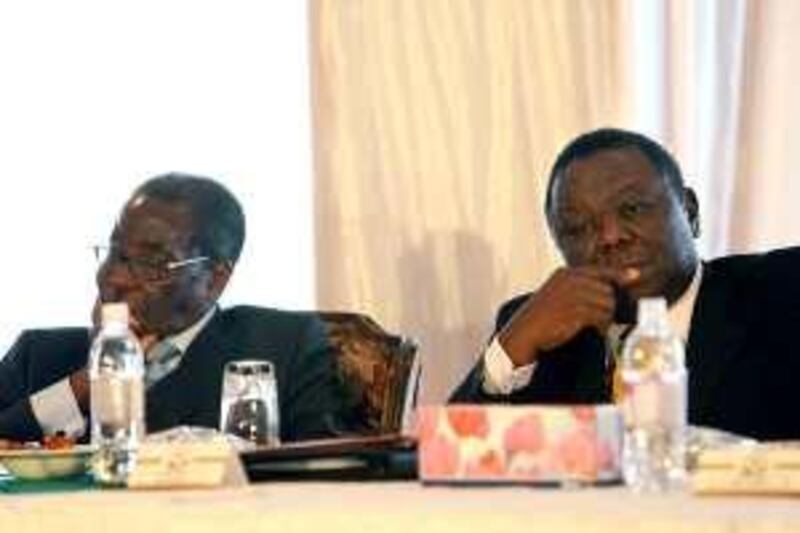BULAWAYO // Five Movement for Democratic Change (MDC) politicians have been jailed recently after being convicted of various crimes - cases that the party says are an effort by opponents to overturn its parliamentary majority. Innocent Gonese, secretary for justice in the main MDC faction led by Morgan Tsvangirai, the prime minister, accused the Zanu-PF party of Robert Mugabe, the president, of orchestrating the court cases on "trumped-up" charges.
"We have pointed out before," Mr Gonese said in a message posted on the party's website, "that the law is being applied selectively with the calculated objective of achieving sinister political ends and in this instance one does not need to be a rocket scientist to figure out that the intention of the politically motivated prosecution of members of parliament of the MDC is to reduce its numbers in parliament."
Mr Gonese said police exuberance in pursuing MDC functionaries contrasts sharply with their failure to arrest Zanu-PF supporters, accused of perpetrating electoral violence last year. "This culture where the victims become the accused and the perpetrators remain untouched must come to an end," he said. MDC won 100 seats in parliament in the March 2008 election, inflicting the first defeat in 28 years on Zanu-PF, which won 99. The smaller faction of MDC got 10 and an independent candidate won the remaining seat in the 210-seat chamber.
Mr Tsvangirai, who joined a co-operative government with Mr Mugabe in February, has often complained of harassment of his officials and supporters. Now after five of his MDC members were imprisoned for kidnapping, fraud, public violence, abuse of subsidised public farming inputs and defeating the course of justice, Zanu-PF has the most seats in parliament. The legislators, Ernest Mudavanhu, Meki Makuyana, Shuah Mudiwa, Mathias Mlambo and Lynette Karenyi, have been given sentences ranging from three weeks to four years in prison. Six more are on trial on charges of public violence, rape, and abuse of farm inputs - raw materials used in farm production - they received from the government.
Although four of the convicted politicians have appealed against their convictions, parliament has already suspended two of them. Section 42 of the constitution says if a legislator is sentenced to death or a jail term of six months or more, "such member shall cease forthwith to exercise his functions". The Zimbabwe Lawyers for Human Rights (ZLHR) said parliament has no right to suspend the duo. Kumbirai Mufunda, the organisation's communications officer, said through the suspensions, parliament has not only usurped the role of the courts but also contravened the basic constitutional rights and freedoms of the legislators and their constituents.
Despite there being a unity government, Zanu-PF still controls the systems of governance, and continues to manipulate them, some analysts say, a scenario that worries the MDC, local civil society and the West. Ray Motsi, pastor at the Baptist Church in Bulawayo, voiced concern over the perception that only MDC members are committing crimes. "We know Zanu-PF people who organised violence against MDC people last year, but they have not been touched," said Mr Motsi, also spokesman of the Christian Alliance, a grouping of churches critical of Mr Mugabe.
"But I must say; vendettas will not help the country. Our politics must mature, if it does not, we will not move forward." Sifiso Nzima, 23, an MDC supporter from Bulawayo, said: "If Zanu-PF is serious with unity and the rule of law why does it cause the prosecution of MDC legislators and supporters only, excluding its own?" "Does this mean that all Zanu-PF legislators who also got the farm inputs used them properly?" said Naboth Mutongi, 29, a builder.
There is a bigger picture to the prosecutions, said John Makumbe, a University of Zimbabwe political science professor. Mr Mugabe wants to reduce the MDC's legislative majority so that by December, when the president could resign - as speculated in some quarters - his party would have achieved a parliamentary majority, enabling it to elect a Zanu-PF figure to replace him. The constitution says if the president resigns, both houses of parliament must elect his or her successor within 90 days and the winner holds office for the term of the current parliament.
"Zanu-PF already controls the senate and wants to do the same in the house of assembly by December when they have their congress," said Mr Makumbe. "If you consider that, together with rumours that Mugabe will announce his resignation at that congress, you will realise that they want to have the right numbers so that whoever parliament elects to succeed him is a Zanu-PF person." tmpofu@thenational.ae





